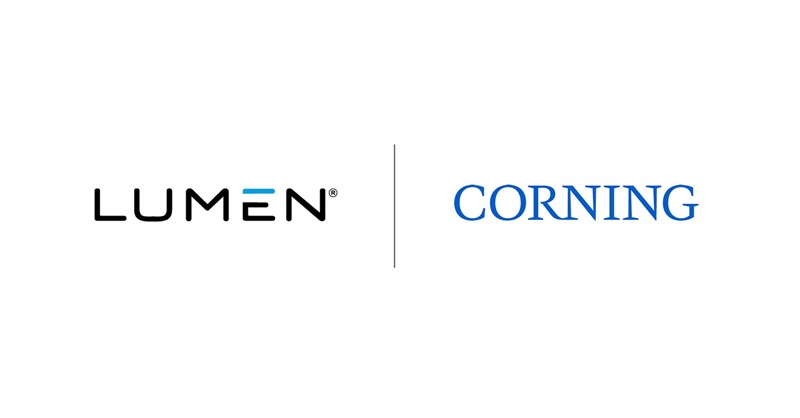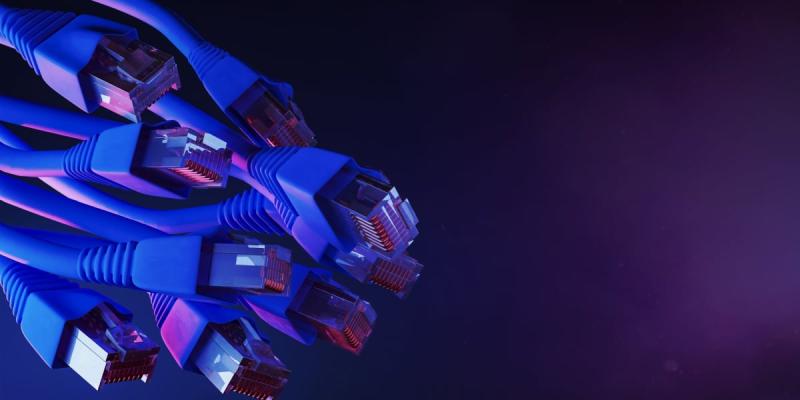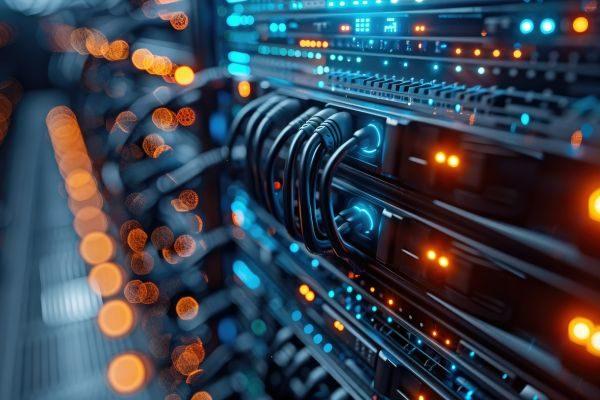Corning and Lumen Ink Deal for Cutting-Edge Fiber-Optic Cable to Boost Data Center AI Capabilities
Corning Incorporated, a leading innovator in materials science, and Lumen Technologies, a key player in the field of integrated telecommunications, have recently joined forces to revolutionize the realm of data center operations. The partnership aims to enhance the performance of artificial intelligence (AI) capabilities within data centers by providing advanced fiber-optic cable solutions. By deploying Corning’s state-of-the-art fiber-optic technology, Lumen will be able to significantly augment their data transmission speeds, enabling rapid and efficient data processing which is crucial for AI applications.
High-speed, reliable data transmission is a critical requirement for AI systems, as these platforms often need to process vast amounts of data in real-time. With this strategic partnership, Corning and Lumen are setting a new benchmark for data center efficiency and performance, while contributing to the advancement of AI technology. This deal signifies a major step forward in the digital transformation era, as it combines Corning’s prowess in fiber-optic technology and Lumen’s expertise in telecommunications to deliver a groundbreaking solution for data centers.
The implementation of Corning’s fiber-optic cables will not only improve the speed and reliability of data transmission but also ensure the seamless operation of AI systems, thereby facilitating better decision-making and operational efficiency in data centers. This partnership could potentially change the landscape of data center operations and pave the way for future technological advancements in the field.

Next-Gen Fiber-Optic Technology: Meeting the Demands of AI in Data Centers
The rapidly evolving landscape of Artificial Intelligence (AI) is exerting immense pressure on existing data infrastructure, necessitating the deployment of next-gen fiber-optic technology in data centers. The data processing needs of AI are voluminous and complex, and traditional data transmission systems often fall short in meeting these robust demands. This is where next-gen fiber-optic technology comes into play. By utilizing light waves for data transmission, fiber-optic technology significantly enhances the speed and capacity of data centers, thereby allowing them to efficiently handle AI’s staggering requirements.
Fiber-optic technology also brings a host of other benefits to data centers. It is highly resistant to electromagnetic interference, ensuring error-free data transmission even in the most challenging environments. Additionally, fiber-optic cables are lightweight and thin, enabling easy installation and maintenance, and reducing the physical footprint of data centers.
However, the transition to fiber-optic technology comes with its own set of challenges. For instance, it requires major modifications to existing data center infrastructure, which can be both time-consuming and costly. Furthermore, while fiber-optic technology offers superior performance, it also demands high levels of expertise for effective operation and management.
Despite these hurdles, the adoption of next-gen fiber-optic technology is inevitable as the influence of AI continues to grow. Advanced AI applications like machine learning, predictive analytics, and natural language processing require a high-speed, reliable, and scalable data infrastructure. Fiber-optic technology is well-equipped to meet these needs, and its adoption will ensure that data centers remain at the forefront of the AI revolution.
In conclusion, next-gen fiber-optic technology promises to significantly enhance the capabilities of data centers, enabling them to meet the formidable demands of AI. By embracing this technology, data centers can ensure their readiness for the future, further cementing their pivotal role in the digital economy.
Strategic Partnership: How Corning and Lumen are Paving the Way for Advanced Data Solutions
Corning Incorporated, a multinational technology company, and Lumen Technologies, a global leader in integrated communications, have established a strategic partnership to advance their data solutions. This partnership is a prime example of how collaboration can drive innovation and growth in the digital age.
Corning’s expertise in optical communications, combined with Lumen’s robust fiber infrastructure, are set to optimize and scale data and connectivity solutions for businesses and consumers. The partnership aims to deliver enhanced network capabilities, such as 5G and edge computing, fostering a more connected and digitally inclusive future. By leveraging their combined strengths and resources, Corning and Lumen are anticipating the future needs of the data market, proactively paving the way for advanced data solutions that will transform the way we live and work.
This partnership underscores the value of strategic alliances in the tech industry, demonstrating how collaborative efforts can accelerate technological advancements, stimulate economic growth, and unlock new opportunities. From a broader perspective, this alliance between Corning and Lumen is a testament to the power of strategic partnerships, illustrating how they can fuel innovation, tackle complex challenges, and drive the digital transformation agenda.

The Role of High-Speed Fiber-Optic Cables in Enhancing AI Performance
High-speed fiber-optic cables play a critical role in enhancing AI performance, functioning as the backbone of modern communications and data transfer. Fiber-optics, with their ability to transmit information at near-light speeds, offer significant advantages over traditional copper-based systems, especially when dealing with sizable volumes of data commonly associated with AI. The high-speed, high-capacity nature of fiber-optics allows for real-time data processing, a vital requirement for AI systems which rely on instant feedback to learn and adapt. This enables AI algorithms to function more efficiently and accurately, responding swiftly to changes and making precise decisions.
Furthermore, the inherent reliability and stability of fiber-optic cables support AI’s need for consistent, uninterrupted data flow. Any interruptions or delays in data transmission can significantly hinder AI performance, causing errors in data analysis and decision-making processes. Fiber-optic cables, known for their resistance to electromagnetic interference, ensure a smooth, steady data stream, effectively supporting AI systems’ demand for high-quality, real-time data.
Moreover, the advent of quantum computing, poised to revolutionize AI, further underscores the significance of high-speed fiber-optic cables. Quantum computing relies heavily on the ultra-fast data transmission capabilities of fiber-optics to perform complex calculations in a fraction of the time required by conventional computers. This could potentially boost AI capabilities to unprecedented levels, opening up new possibilities in various fields such as healthcare, finance, and autonomous vehicles.
In a world where data is the new oil, the role of high-speed fiber-optic cables in powering AI cannot be overstated. By providing a fast, reliable, and high-capacity communication channel, fiber-optics are pivotal in driving AI technologies forward, enabling them to reach their full potential and reshape the future.
Data Center Innovations: Corning and Lumen’s Collaborative Efforts
Corning Incorporated and Lumen Technologies, two renowned firms in their respective domains, have joined forces to push the boundaries of data center innovations. Corning, a pioneer in materials science, has been at the forefront of the telecommunications and data transmission industry for several decades. On the other hand, Lumen Technologies, previously known as CenturyLink, has been a dominant force in the communications and IT services sector. Together, they are revolutionizing the data center landscape.
Their collaborative efforts have led to the development of advanced fiber optic solutions that enhance data center connectivity and performance. Corning’s state-of-the-art optical fiber technology, renowned for its superior quality and performance, paired with Lumen’s vast network infrastructure and IT services expertise, has resulted in an innovative solution that addresses the growing demand for high-speed data transmission and storage.
This partnership has resulted in an increased capacity for high-bandwidth applications, improved data center efficiency, and reduced latency. The integration of Corning’s optical fiber technology and Lumen’s network services has facilitated faster, more reliable data transmission, addressing the increasing requirements of modern businesses for real-time access to data and applications. This collaboration has also been instrumental in promoting sustainability in the data center industry, with solutions aimed at reducing energy consumption and carbon footprint.
In summary, the combined efforts of Corning and Lumen have not only resulted in significant advancements in data center technology but have also set a new benchmark for future developments in this field. Their collaboration serves as a shining example of how combining expertise and resources can lead to ground-breaking innovations that meet the evolving needs of businesses and consumers in the digital age. The synergy of these two industry leaders is poised to drive further advancements in data center efficiency, performance, and sustainability.

Future-Proofing Data Centers: The Impact of Advanced Fiber-Optic Infrastructure
Future-proofing data centers is a necessity in this rapidly evolving technological landscape. The advent of advanced fiber-optic infrastructure plays a vital role in this process, significantly impacting the efficiency, speed, and reliability of data centers. Fiber-optic technology, with its capacity for high-speed data transmission over long distances, is an essential tool in the modernization of data center infrastructure. The shift towards fiber-optics not only offers superior bandwidth and lower latency but also reduces energy consumption, making it a sustainable choice for the environment.
The impact of this advanced infrastructure is even more pronounced when considering the rising demand for cloud computing services, big data, and artificial intelligence — all of which place significant strain on traditional data centers. Fiber-optic infrastructure is more than capable of handling this increased data load, ensuring that data centers can keep pace with the growing needs of businesses and consumers alike.
Furthermore, the inherent scalability of fiber-optic technology is a major asset in future-proofing data centers. As data needs continue to expand, fiber-optic infrastructure can easily be upgraded to accommodate this growth, ensuring that data centers remain relevant and effective in an ever-changing digital environment. This adaptability, combined with the efficiency and reliability of fiber-optics, makes it a powerful tool in the ongoing evolution of data centers.
Moreover, the resilience of fiber-optic infrastructure to external disruptions such as electromagnetic interference further enhances the reliability of data centers. This is particularly crucial in sectors where uninterrupted data access and transmission are paramount, such as healthcare, finance, and telecommunications.
In conclusion, the impact of advanced fiber-optic infrastructure on future-proofing data centers is profound. By leveraging the speed, efficiency, scalability, and reliability of fiber-optics, data centers can confidently navigate the challenges of the digital age, ensuring they remain at the forefront of technological advancement.
